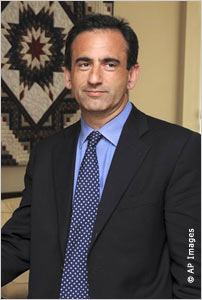NATO Summit to Reaffirm Afghan Transition Plan
NATO Summit to Reaffirm Afghan Transition Plan
10 May 2012
The May 20–21 NATO Summit in Chicago will focus on the alliance’s mission in Afghanistan, including its shift from a combat role to a supporting role for Afghan security forces, as well as defense capabilities and partnerships among member nations to meet the security challenges of the 21st century.
In testimony before the U.S. Senate Foreign Relations Committee May 10, the State Department’s assistant secretary for European and Eurasian affairs, Philip Gordon, told U.S. lawmakers he believes the summit will result in an agreement on “an interim milestone” in 2013 when the NATO-led International Security Assistance Force (ISAF) will shift its mission from combat to providing training and assistance as alliance members agreed at their 2011 summit in Lisbon.
“Our core principle has been in-together, out-together. And at Lisbon, the alliance as a whole, ISAF as a whole, agreed that combat troops would remain, performing their mission, being successful to the end of 2014, after which they would be gone,” Gordon said.
He said the peak number of troops in the Afghan national security forces (ANSF) will be around 350,000, but the force will likely decrease to 230,000 troops over the next 10 years.
“Our principal guiding thinking about this all along is that ANSF needs to be sufficient to do the mission, but also sustainable, which is to say affordable over the long term,” he said.
He added that “the Afghans can't do this by themselves,” and the international community “is going to have to step up and play a major role, probably for the next decade, in ensuring that ANSF are sustainable.”
Deputy Assistant Defense Secretary for European and NATO Policy James Townsend said 2013 will see the completion of the transition of security responsibility to the ANSF, which are already taking the security lead in much of the country.
Townsend praised the performance of the ANSF in recent security incidents, such as the April 15 attack by Taliban forces on targets in Kabul.
“We've been pretty impressed with the work of the ANSF,” he said. “They are certainly up to the task of taking the lead in terms of combat.”
Despite differences within NATO, all of its members agree that the alliance must be “unified and strong,” Townsend said.
“Looking out into the future, challenges to the United States and our allies can come from ballistic missile proliferation, cyber attack, terrorism, weapons of mass destruction, as well as from just the instability that we can see happening as turmoil takes place as nations wrestle to set up their forms of government. We must be ready to meet emerging threats. We would prefer to meet these challenges together with allies and not alone,” he said.
He cited NATO’s role as “a hub and an integrator of a network of global security partners” that has allowed it to put “military teeth” behind alliance political decisions, such as its role to protect Libyan civilians from former Libyan leader Muammar Qadhafi’s security forces in 2011.
Libya offers “an illustration on how we were able to come together politically, work with the United Nations, work with the international community — not just with our European allies, but broadly — and then take a course of action,” and “execute it successfully,” he said.
Gordon said the meetings in Chicago will not be “an enlargement summit” to expand NATO's current membership, but the United States remains “as supportive as ever of the open-door policy,” and Secretary of State Hillary Rodham Clinton plans to meet with representatives from its four aspirant members: Bosnia and Herzegovina, Macedonia, Montenegro and Georgia.
“NATO's door remains open to European democracies that are willing and able to assume their responsibilities and obligations of membership,” he said, and all four countries are “working closely with allies to meet NATO membership criteria.”
Regarding NATO’s relationship with Russia, there continues to be cooperation in areas of mutual interest despite disagreements over missile defense and Russia’s military occupation of parts of Georgia, Gordon said.
“The best example of cooperation is our joint efforts in Afghanistan, where Russia's transit support has been critical to the mission success,” he said.
“Let me be clear: NATO is not a threat to Russia nor is Russia a threat to NATO,” Gordon said.
